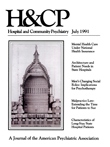Mental Health Services Under a U.S. National Health Insurance Plan
Abstract
Sometime during the 1990s, the U.S. Congress could enact legislation that would establish universal access to basic hospital and physician services and, later, create a national health insurance plan. The author explores the potential effect of these programs on state psychiatric facilities; short-term acute psychiatric care facilities, including those under for-profit ownership; mental health professionals; and delivery of patient care. Each year about 63 million uninsured Americans would be eligible for basic health care under a universal access program, and mentally ill patients who are now unable to afford care would then be eligible for limited mental health services. National health insurance, enacted after the universal-access approach fails, is likely to support the current trend of proportionately more ambulatory and less inpatient mental health care. Wealthy Americans are likely to use the national health insurance system but may also use private mental health services, thereby perpetuating the current pluralistic health care delivery system.
Access content
To read the fulltext, please use one of the options below to sign in or purchase access.- Personal login
- Institutional Login
- Sign in via OpenAthens
- Register for access
-
Please login/register if you wish to pair your device and check access availability.
Not a subscriber?
PsychiatryOnline subscription options offer access to the DSM-5 library, books, journals, CME, and patient resources. This all-in-one virtual library provides psychiatrists and mental health professionals with key resources for diagnosis, treatment, research, and professional development.
Need more help? PsychiatryOnline Customer Service may be reached by emailing [email protected] or by calling 800-368-5777 (in the U.S.) or 703-907-7322 (outside the U.S.).



